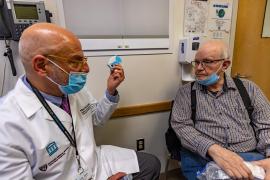HIV Prevention Programs in Africa Should Continue To Promote Safer Sex, Letter to Editor Says
Unsafe sex "continues to be the predominant mode of HIV transmission in sub-Saharan Africa" and should therefore continue to be the primary focus of HIV prevention programs, Paulo Teixeira, HIV/AIDS program director for the World Health Organization, and Marika Fahlen, director of social mobilization and information for UNAIDS, write in a Washington Post letter to the editor. Teixeira and Fahlen write in response to an Aug. 21 Post opinion piece by Holly Burkhalter and Eric Friedman of Physicians for Human Rights' Health Action AIDS Campaign that called for WHO and UNAIDS to pay more attention to the issue of unsafe injections, blood safety and universal precautions. Although Burkhalter and Friedman "rightly" point out the need to address unsafe health care procedures as part of a "combination of prevention measures," such procedures account for only 10% of new HIV infections, Teixeira and Fahlen say. UNAIDS and WHO recognize that a comprehensive approach to HIV prevention is needed, including programs that target unsafe sex, mother-to-child HIV transmission, unsafe blood and blood products and unsafe injections, Teixeira and Fahlen say (Teixeira/Fahlen, Washington Post, 9/3).
This is part of the Morning Briefing, a summary of health policy coverage from major news organizations. Sign up for an email subscription.





